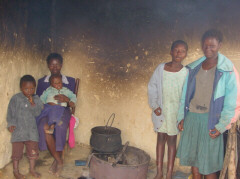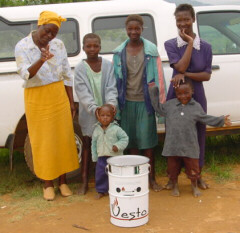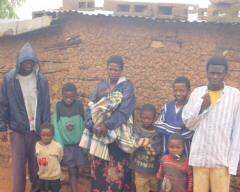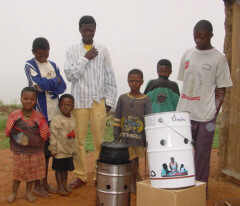 |
CARBON DIOXIDE AND BLACK AIRBORNE PARTICLE OFFSET TRADING STORE | |
|
Combining science, responsibility and humanitarian service. If you can read this web page you are probably someone who occasionally travels by air. If you have been following the debate over the Kyoto Protocol you will be aware that an international carbon trading system has been developed where it is possible to mitigate the effects of burning fossil and other fuels by paying for the construction or placement of energy efficient devices or renewable energy technologies in other localities. In this way a 'polluter' can buy back the effect of some or all of their contribution of carbon dioxide (CO2) to the global atmosphere through an 'offset' program. Air travel is a significant contributor to atmospheric CO2 and it is possible to calculate the amount generated per passenger-mile. There is a lot of work being done to determine the impact of CO2 on the global ecosystem. In fact a great deal of the focus is placed upon this one gas and not very much work has been done on other possible sources of heating of the atmosphere. Recently, scientists have shown that the effect of smoke, black and dark particulates from poor combustion also have important impacts on the climate. The warming effects of uncounted trillions of small dark airborne particles being heated by the sun are not as large as those of CO2, but they are still significant. There is no program in place for the financing of black particulate mitigation efforts and technologies. In practice this means that if you want to do something as an individual to 'undo' the effects of the CO2 and black particulate emissions you have made by travelling (or any other contribution) there isn't much you can so about it unless you are involved in one of the Clean Development Mechanism projects. CDM falls under GEF- the Global Environment Forum, and that in turn is part of the Kyoto Protocol. It involves complex activities beyond the capacity of an individual and thus is basically an inaccessible project. If you want to reduce your environmental footprint there isn't much you can do to get in on CDM activities other than perhaps visiting www.co2.org (which is a suggested starting point). We at New Dawn Engineering have an appropriate technology solution which you can voluntarily use. We have set up a program that allows you to purchase black particle and CO2 offsets. The mechanism for achieving this involves working out how much you want to offset and then placing fuel efficient biomass cooking and heating stoves in the homes of people who will use them, where that stove will save a known amount of fuel and reduce the household's total atmospheric contamination. There are obvious social benefits flowing from this as well. With a biomass stove this is accomplished by having a measurable reduction in the consumption of fuel so most fuel burning is avoided. Trees remain un-cut, wood remains unburned, fuel supplies are stretched. We will assist you in calculating your contribution to the emissions and work out how many Vesto fuel efficient biomass stoves we would have to place in a suitable homes to offset it. At the present time we have chosen to place Vesto stoves (see the technology described elsewhere on this site) in child-headed households in Swaziland, mostly AIDS orphans. AIDS and HIV infection are decimating the Swazi population. About 7% of the population are orphaned at present. It is expected to rise to 12% in the next 6 years. Child headed households are extremely vulnerable. Orphans and Vulnerable Children (called OVC's) are left to fend for themselves with erratic or no support from family and a community reeling from the effects of an HIV infection rate that reaches to 40% of some population segments. At this time we are relying on the voluntary efforts of the good people at the Moya Child Care Centre in Malkerns, Swaziland, the Malkerns Valley Rotary Club and the local Women's Institute to identify homes headed by children who are is such undeniably desperate circumstances that the provision of a fuel efficient stove will make a significant impact. At this time we have more children in need than stoves to give them. These criteria assure you, the possible supporter of this atmospheric effects mitigation program, that your money is achieving not only the desired effect of reducing the consequences of your atmospheric footprint, but that it is doing so in a manner that is of clear and certain benefit to the truly needy. It is our intention at this time to try to take a picture of each recipient household receiving a Vesto, in the same manner that the Wheelchair Foundation takes a picture of each recipient to eliminate fraud and duplication. As long as this is sustainable we will continue with it. Example of a Mitigation Effort: The atmospheric impact (particulates and CO2) of a return flight from Seattle to Johannesburg via New York as well as a return flight from Seattle to Chicago can be offset by placing 8 Vestos in rural households. This calculation was made by Dr Tami Bond. A formula for this will be posted on this page soon. New Dawn Engineering is making the Vestos available to the project at a discounted NGO price. The 8 mitigation Vestos cost $28 each = $224 total. Dr Tami Bond can be reached at yark@uiuc.edu Offsets can be purchased from info@newdawnengineering.com, with the subject line containing "Offsets [your name]" Vestos can be sourced from info@newdawnengineering.com or info@vesto.co.za or vesto@newdawn.sz |
Click on any of the pictures below to make them larger. Hlendweni Area - the first Vesto donated to a child-headed household through this program. Hlendweni is west of Motshane and south of the Ngwenya border post.  15 December 2004 "Nombuso Dlamini, (16) is head of the household, seated in the corner together with her sister's children, Bayanda Simelane (2) and Sibonginkhosi Simelane (4) who lives with them. Their sister lives with their aunt." "The two girls on the right are the younger, Thandiwe Dlamini (11) and Vuyisile Dlamini (13). This is the home made stove they have been using ... an open fire in a cut-off drum. When we arrived the hut was filled with smoke and was difficult for us to breathe." "Thabsile Shongwe from New Dawn Engineering brought out the Vesto stove and we were utterly amazed as to how little fuel was required and virtually smokeless. The stove is not only fuel efficient and clean, but takes very little room, is light and mobile. The family were utterly delighted. During the school term, Vuyisile stays with her grandmother, near to the high school and Nombuso stays at home, to look after her younger sister and sister's children. She walks 10 km to school." "Thank you for giving them this stove which will save time in collecting wood, and cuts down cooking time. I was so impressed, I showed one of your stoves to Tuire Thatcher who is coming in the morning to purchase one for her security staff, together with a paper briquette machine!" "In appreciation to you all." Jane Cox Director - Moya Center for Orphans and Vulnerable Children moya@swazi.net Thabsile Shongwe training the children in the use of the first Vesto stove funded by the atmospheric particulate and carbon-dioxide mitigation traders - Hlendweni Area, Swaziland 14 Dec 2004   16 December 2004 "We visited this family today in the mountains of Swaziland. They are headed by 22 year old Hlob'sile Shongwe who returned home after the recent demise of her husband. She brought her three children, 5 month old Nkhosikhona Gama (boy), Nkhosingiphile Gama (girl, 4), Bethulisile Gama (girl, 5) with her." "The original family are, Wanda Shongwe (young man, 21) - unemployed,Thuli Shongwe (girl, 19), Mthobisi Shongwe (boy, 16), Nonkhululeko Shongwe (girl, 14), Khumbuzile Shongwe (girl, 14), Gijimani Shongwe (boy, 11), Mbongeni Shongwe (boy, 10), Njabulo Shongwe (boy, 7). All of the children under 19 years of age are at school, being government sponsored and one had obtained church sponsorship." "Rain fell, as we swilled our way through the mud reaching a homestead where the bricks are literally melting away in the rain. The family were huddled in the "kitchen", around a fire, trying to keep warm, the room filled with smoke. Some of the children had coughs. We found out that they were dragging branches about a kilometre from the homestead to cook with. When Thabsile Shongwe showed them the Vesto stove they were amazed. This gift would not only save the energy the family were expending in collecting wood, but a "smoke free" stove, which heats up exceedingly fast. This is absolutely ideal for all these children who need to get to school very early in the morning with something hot in their stomachs, be it tea or whatever they might have." "Thank you all again for assisting this family ... it really is quite some Christmas gift!" Jane Cox Director - Moya Centre for Orphans and Vulnerable children. moya@swazi.net  Thabsile reported that when she arrived all 12 of the children were huddled in the 'kitchen' - a bare room of about 3 square metres - with an open fire burning on the floor. They owned three pots, two of which fit the stove properly. They are fed by a local communal feeding scheme but as it was raining that day there was going to be no food cooked at the Chief's place (the umphakatsi) so they were just trying to keep warm and dry until Friday. Jane fortunately brought them some food paid for by a donor. When she left they were cooking it on the new stove which had rendered the room nearly smokeless in spite of the damp. |
|
| << Back | ||